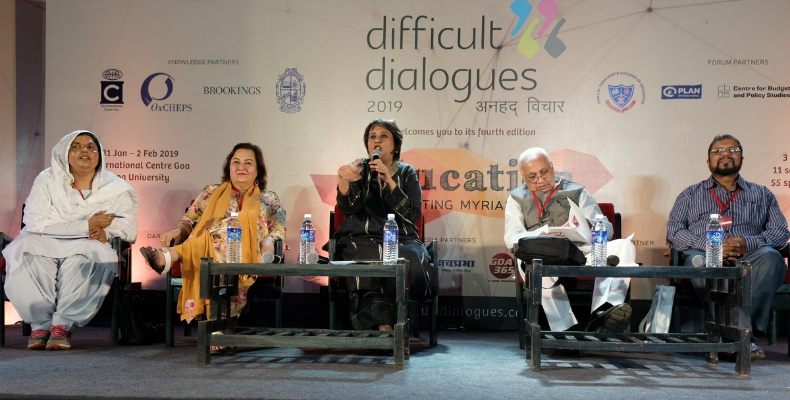The fourth annual edition of Difficult Dialogues hosted a series of discussions on education and the myriad challenges in improving quality standards across our vast country. International experts from leading educational institutions in India and the UK including Oxford, development experts, and politicians spoke on panels over three days, at the International Centre Goa from January 31 to February 2.
Some of the challenge areas addressed in the Difficult Dialogues discussions included a sweeping lack of funding, weak political will to prioritise education from successive governments, a severely overburdened curriculum, disparate priorities in developing curriculum including political pressures, producing graduates that are not employment-ready, threats to academic freedom under the current administration, inculcating values and life skills along with education, the lack of autonomy of educational institutions, and bureaucratic powerlessness.

The panelists
Some of the key speakers and participants at Difficult Dialogues were additional solicitor general Pinky Anand, AAP member Atishi Marlena, Congress MP Renuka Chowdhury, journalist Barkha Dutt, actor Pooja Bedi, former cabinet minister Arif Mohammed Khan, Vice Chancellor of Goa University Varun Sahni, Yamini Aiyar (Centre for Policy Research), Yasmin Ali Haque (UNICEF), Ashok Misra (Former Director – IIT Bombay), Srinivasan Vadivel (NCERT), Apoorvanand Jha (University of Delhi), Deepa Narayan (former World Bank advisor), David Mills (Oxford University), Rashmi Misra (Vidya), Poonam Mehta (PLAN India), Victoria Mukerji Chowgule (Dempo College) and Arathi Sriprakash (University of Cambridge).

The dialogues
- Regarding the lack of financing for education, Dr. Sukanya Bose, Faculty at the National Institute of Public Finance and Policy, New Delhi, said there is no financial roadmap in place for financing education which would lead to what was laid out in the Right to Education act of 2009. There are around 146 million children in the public education system and 15 million outside the system, which is the government’s responsibility to bring them back. So there is a need to spend 1.5% more of the GDP.
- Dr. Yasmin Ali Haque, the UNICEF Representative in India, said “Only two percent of the education budget is spent on teacher training so we’re not spending on the human resources for this sector. Government funding is being supplemented by CSR or grant funding.”
- The panel on ‘Curriculum and Pedagogy’ underlined the need to “create curriculum material in local languages, resist politicization of textbooks and the involvement of specialist institutions to develop such books.”
- The macro environment for academia posed concerns around reprimanding public university professors for expressing their anti-establishment views. Speaking on the panel ‘New Threats to Academic Freedom’, Hindi Professor Apoorvanand Jha of Delhi University cited many examples of professors including Anand Teltumbde from Goa Institute of Management, who have been arrested, hauled up or suspended for minor reasons that have been branded as anti-national or anti-army. “This culture is new… the majoritarian, Hindutva view. The branding of professors Nivedita Menon and Romila Thapar (is serving to) dumb down universities. The threat is this party BJP and its parent RSS which has been rallying against academics. What’s new is this organized attack on intellectuals.” The panel suggested starting critical thinking and freedom of expression modules in schools itself, the erecting of memorials to free speech on campuses and encouraging the media to celebrate academics brave enough to raise their independent voices.
- At a panel about Elementary Education, Aam Aadmi Party (AAP) member Atishi Marlena said “What has really changed is that there is political will, where the government in power cares about private schools. Someone should research the links between politicians and private schools. Arvinder Singh Lovely is a politician who owns a private school. If the people in power have incentives in private education, then why would they improve public education?”

A multi-city college debate competition called Daring Debates was held at Difficult Dialogues, moderated by actor Pooja Bedi, on the topic, ‘Is the Indian curriculum and its teaching methods redundant?’ was won by students Anmol Kang from Manipal Institute of Medical Sciences in Gangtok, Sikkim, and P. Lokeshwari from Pondicherry Institute of Medical Sciences.
(Except for the headline, this story has not been edited by ItsGoa staff and is published from a syndicated feed.)


